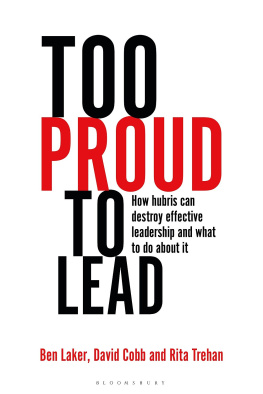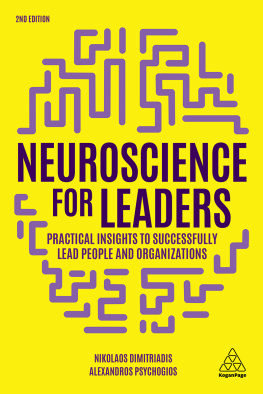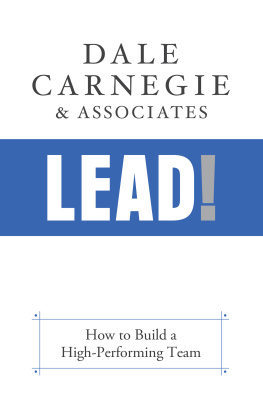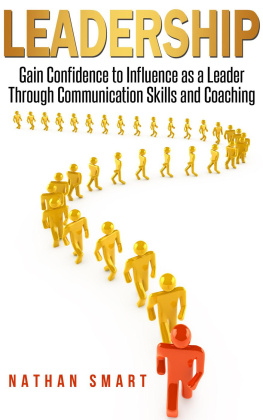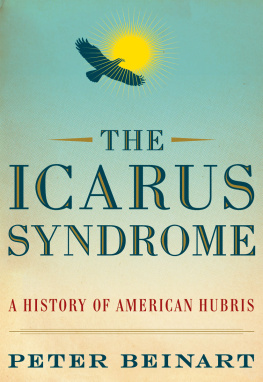An essential read if we truly are to confront the huge challenges of modern life.
Margaret Heffernan, TED speaker and bestselling author of Uncharted
A worthy reflection, particularly in light of the challenges of the coronavirus pandemic that has tested leaders globally.
Stephen Drill, Europe Correspondent, Daily Telegraph
Through incredibly engaging stories and compelling evidence, Too Proud to Lead clarifies the risks, costs, and enablers of hubris, which is paramount if leaders are to demonstrate more significant levels of collaboration, inventiveness, and trust in their careers.
Laura Jayes, journalist and Sky News anchor
As businesses face unprecedented uncertainty, leaders must work hard to build greater collaboration, inventiveness, and trust. Too Proud to Lead explains why, and in doing so, teaches leaders how to demonstrate empathy, vulnerability, and authenticity.
Phil Benton, General Manager, Adidas
With great power comes great responsibility. Too Proud to Lead is a powerful wake-up call for leaders and a reminder about how they can tap into their best selves to elevate everyone around them.
Dorie Clark, Professor, Columbia Business School
Too Proud to Lead is an indispensable guidebook for leaders who strive to unleash their organizations intensely human, creative power.
Michael Chavez, CEO, Duke Corporate Education
Too Proud to Lead is a fantastic read that identifies hubristic leadership in action. Its essential to colleagues who struggle to find alignment with leaders and is a powerful reminder that as we become more successful, we need to be even more conscious about how our values and ethics inform our choices.
Shaheena Janjuha-Jivraj, Associate Professor, HEC Paris and co-author of Futureproof Your Career
Too Proud to Lead is highly insightful, extraordinarily interesting, and thoroughly enlightening.
Simon Shaw MBE, 2003 Rugby World Cup Winner
A very insightful and engaging read I would highly recommend it to anyone with their own business or looking to start one.
Roger Sanchez, Grammy Award-Winning DJ and Producer
To Andrew, for introducing discernment and discipline. Your influence has been profound, and without which, this book never would have been written, so thank you, for everything.

Contents
CHAPTER 1
Hubris: A Matter of Life and Death
CHAPTER 2
A Study of Hubris
CHAPTER 3
The Pressure for Success
CHAPTER 4
Walking the Hubris Tightrope
CHAPTER 5
The Damage Hubris Inflicts
CHAPTER 6
Balancing Collaboration with Urgency
CHAPTER 7
The CEO Hubris Timeline
CHAPTER 8
A Better Way to Lead
CHAPTER 9
Conclusion: Conquering Hubris
Foreword
by Margaret Heffernan
Success is a poor teacher. Whether in business or in life, it is impossible to analyse all of the forces that led to a positive outcome. Has my marriage proved fulfilling because I chose well, because I was lucky or because we were never really tested by tragedy or accident? Did the business thrive because my idea was brilliant, because the people around me took a weak concept and turned it into something viable, or because my competitors lacked cash or imagination? The study of leadership is rife with attribution errors which seek to explain what cannot be proved.
But when success follows success, the easy explanation is: I did it. And the more success, the more confident that explanation appears. It is only human to begin to believe oneself invincible. That is where hubris kicks in: when imagining that one is solely responsible for ones own success.
Institutional cultures frequently make it worse. Rewards for success are large, tangible and visible: the office, the car, the lifestyle convey a potent message that a thriving organization is the fruit of one mans (or, occasionally, one womans) labour. The human habit of hero worship amplifies a process that is deeply difficult to resist.
What gets forgotten is how many people contribute to any success, the role that luck invariably plays, the narrow escapes, the happy accidents and all the learning along the way. All are bundled into the magical property of a single person or institution and get forgotten. That the world keeps changing compels us all to keep learning but hubris makes it feel unnecessary.
The unpredictability of contemporary life now makes hubris more dangerous than ever. Experts in forecasting argue that the best informed people rigorous in consulting a wide range of authoritative information sources, careful to adjust their predictions, meticulous in assigning and refining probabilities and relentless in learning from their mistakes can produce accurate forecasts only about 400 days out. For the less rigorous, the horizon for useful prediction is closer to 150 days. And even then, uncertainty remains a constant fact of life. So we have to stay alert, paying attention to the new, the inexplicable and anomalous. Reframing perspectives, listening to divergent voices, being prepared to argue and debate in order to see better and further, is a fundamental task of decision makers. Assumptions about oneself, about the world are dangerous; what was true yesterday might not be true today. So there can be no room for hubris in our leaders or organizations. If we are to confront the huge challenges of modern life economic uncertainty, inequality, climate crisis we can do so only with humility and eyes wide open.
Margaret Heffernan, TED speaker and bestselling author of Uncharted
March 2021
The word hubris originates from ancient Greece. Initially used to describe behaviour that shamed or humiliated a victim, it has since evolved to describe extreme, foolish, or dangerous pride and overconfidence. Today, in the business world and in politics we recognize hubristic tendencies best by their symptoms: no prisoners taken, lack of care for others, fierce defence of reputation and power and, above all, defiant and dangerous self-interest.
Hubris is not just a danger for the person exhibiting its characteristics, but also for the people this person is tasked with leading.
We do not have to look very far to find examples of individuals and organizations displaying such tendencies; indeed evidence suggests it is spreading. The growth in usage and popularity of this phrase throughout the 2010s and into the 2020s suggests a doubling down on hubris. Doubling down is originally a gambling term, referring to a high-stakes gamble: defiance in the face of evidence and consensus. It is sticking unwaveringly to a decision or plan of action regardless of consequences or known fallout. It is an apt way to think of hubris. Tough leaders double down in the hubristic belief that listening, conceding a point, ceding or sharing power are all just signs of weakness.
The breeding ground for hubris often starts with success. It is the entry point for hubris.
The pressure for success is immense, especially in an environment where the motto is move fast and break things. One success after another, builds self-confidence. But achieving more in the same way morphs self-confidence into a (false) sense of infallibility. Hubristic people can become larger than life, assuming they can do no wrong. The more an individual with the Midas touch wins, the less open they are to critical feedback: why would this person need feedback when they have already cracked the code to success? Additionally, as fans and minions (descriptors they use to define other people) continue to cheer them on, hubristic individuals typically seek to feed their self-glorifying adulation tendencies. They become intensely focused on repeating their successes, seeking to make the next one even bigger and better. Finally, the individual ascends (in their minds) to a status that is seemingly invincible.

